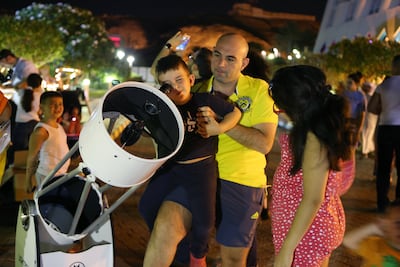The Perseids meteor shower is set to peak in the UAE and around the world, lighting up the skies on August 12 and 13.
The cosmic event will feature about 100 meteors an hour shooting across the night sky.
Visibility will depend on the weather but so far the forecast is for a clear sky with little interference from the Moon.
“The Perseids is one of the best meteor showers to observe, producing up to 60 to 100 meteors per hour at its peak,” Dubai Astronomy Group said.
“It is produced by Comet Swift-Tuttle. The Perseids are famous for producing a large number of bright meteors."
How to watch from the UAE
The shower will peak on August 12 and the morning of August 13 and the best viewing will be from a dark location after midnight.
It will be visible to the naked eye but telescopes will enhance the viewing experience.
The Dubai Astronomy Group is hosting a viewing event at Al Awir desert Saturday night, with tickets costing Dh200 to Dh300.
Telescopes will be provided.

Several YouTube channels will broadcast the celestial event live.
"With its peak around August 13, the Perseids can produce an impressive display of up to 100 meteors per hour under optimal conditions," said the Al Sadeem Astronomy, which has an observatory based in Abu Dhabi.
"From Abu Dhabi, at the peak of the shower, the radiant will fall at the altitude of 56° above your horizon, which may help the observers to see up to 125 meteors per hour."
What causes the showers?
Nasa said the Perseids are one of the best meteor showers of the year.
They leave light and colour behind them as they streak across Earth's atmosphere.
"Perseids are also known for their fireballs,"," the space agency said. "Fireballs are larger explosions of light and colour that can persist longer than an average meteor streak.
"This is due to the fact that fireballs originate from larger particles of cometary material."
Perseids are leftover pieces from Comet Swift-Tuttle, which was discovered in 1862.










